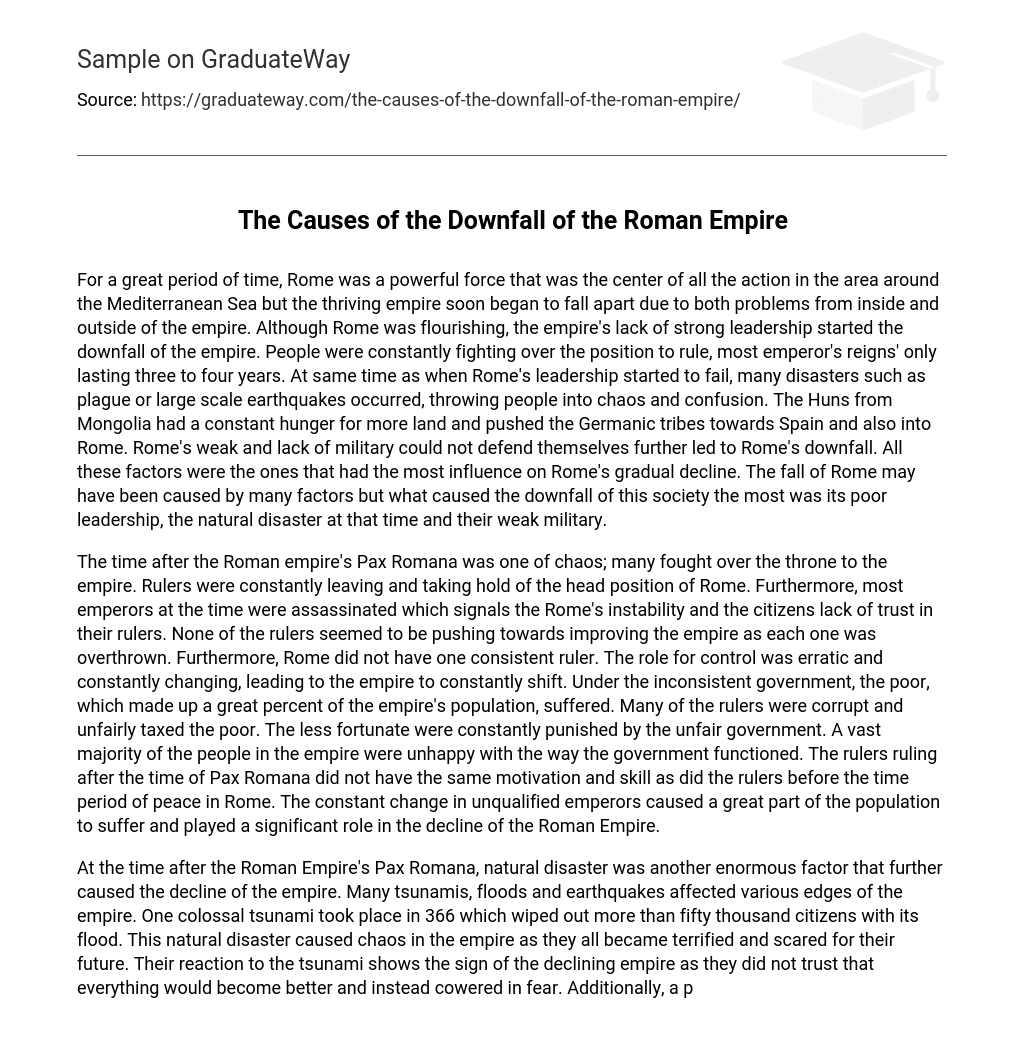Rome held great power and acted as the central force in the Mediterranean Sea region for a significant period of time. However, internal and external issues eventually caused the empire to crumble. The lack of strong leadership played a crucial role in its downfall, with constant power struggles resulting in short reigns for most emperors lasting only three to four years. At the same time, Rome faced disasters like plagues and large-scale earthquakes that created chaos among its people. Additionally, the Huns from Mongolia had an insatiable desire for more land and pushed Germanic tribes towards Spain and into Rome. The empire’s weak military and inability to defend themselves further contributed to their demise. These factors significantly impacted Rome’s gradual decline. While multiple factors may have influenced Rome’s fall, its poor leadership, natural disasters, and weak military were the primary causes of its downfall.
Following the Pax Romana, the Roman Empire went through a period of turmoil marked by power struggles and instability. There was a succession of rulers, many of whom were assassinated, which exemplified the lack of trust and stability in leadership. None of these rulers focused on improving the empire as they were all overthrown, resulting in inconsistent governance. This constant change in control led to frequent shifts within the empire. The impoverished, who comprised a significant portion of the population, faced immense hardships under this unstable government. Corrupt leaders unjustly taxed those less fortunate, subjecting them to relentless punishment. Consequently, most of the population became dissatisfied with how the government operated. The successors to the Pax Romana era lacked both motivation and competence compared to their predecessors, exacerbating suffering and contributing significantly to the decline of Rome.
The fall of the Roman Empire was greatly influenced by natural catastrophes that occurred after the Pax Romana. Different regions of the empire suffered devastation from multiple tsunamis, floods, and earthquakes. In 366, a massive tsunami submerged over fifty thousand citizens, resulting in widespread chaos and instilling fear for what lay ahead. This response to the tsunami serves as evidence of the empire’s decline since its inhabitants lost hope in a brighter future and instead succumbed to fear. Additionally, a plague spread throughout the empire, affecting numerous residents. This natural disaster not only caused an economic downturn but also reduced the pool of potential army recruits. In general, Rome’s collapse can primarily be attributed to these natural disasters that weakened defense capabilities, depleted population numbers, and caused economic instability.
The decline of the Roman empire can largely be attributed to the failure of the Roman military in defending itself against various challenges. The military was ill-prepared and faced numerous issues. Certain individuals, such as clergy, slaves, cooks, and bureaucrats, were exempt from the draft, which resulted in a smaller pool of potential soldiers. Furthermore, the army displayed a lack of willingness to fight and showed laziness. Neglecting ground drills and failing to utilize available armory during battles were common occurrences. As a result, the Roman army made little effort to assemble an effective defense force for their country.
This issue became problematic when war-hungry tribes started threatening Rome’s borders after a period of peace known as Pax Romana. These nearby tribes breached Roman borders due to relentless attacks by fearless and tenacious fighters like the Huns who sought land expansion opportunities. The Huns easily defeated the unmotivated Romans, allowing them and other tribes to gradually infiltrate and take control over the Roman empire. The absence of a strong Roman army capable of defending against these nearby tribes significantly contributed to the decline of the empire.
The downfall of the Roman Empire can be attributed to various factors, including lack of guidance, environmental circumstances, and military inaction. Following the period of Pax Romana, the empire began to decline. Emperors ruled with less rigor, resulting in unfair treatment of the poor and confusion due to frequent changes in leadership. The military also deteriorated as it became increasingly unmotivated and lacked citizens willing to fight. These factors led to a failure to defend against nearby invaders. Additionally, numerous natural disasters further weakened the empire, causing a decline in population and negatively impacting the economy. Overall, these factors contributed to the ultimate failure of the Roman Empire.





